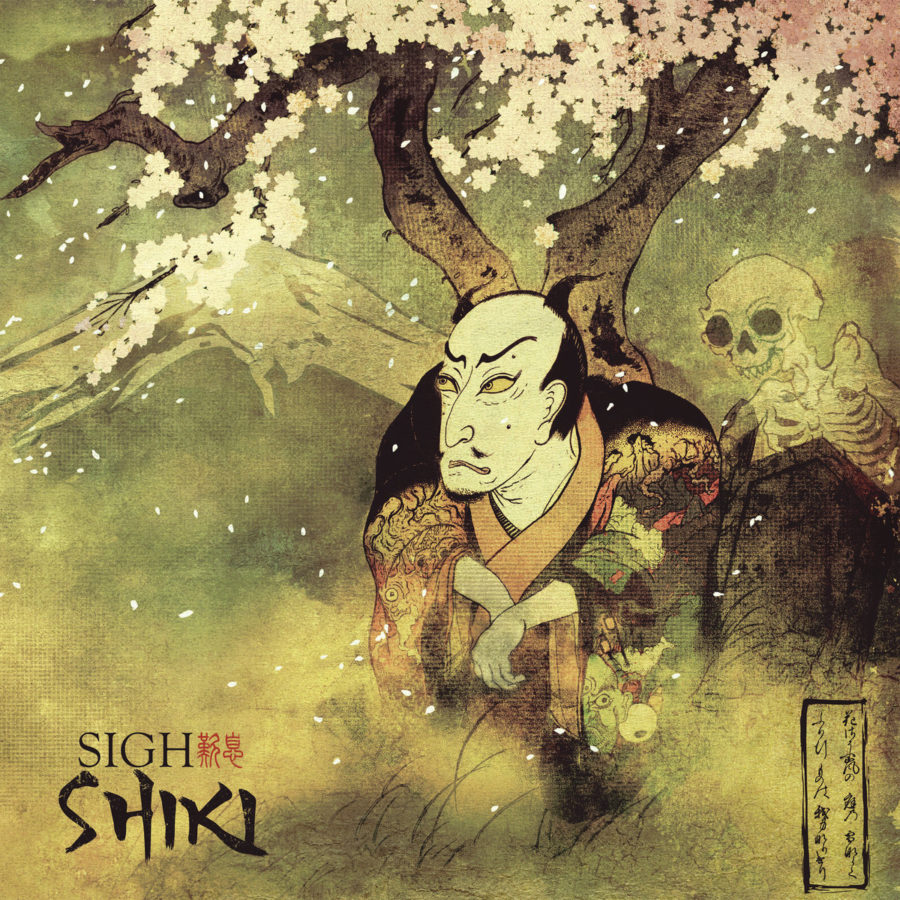Sigh returns to beastly and harrowing perfection on their newest album “Shiki”
Christopher Catterall
Album cover of Sigh’s latest album “Shiki,” a representation of an ancient Japanese poem about the death of cherry blossom trees.
October 17, 2022
There’s a common litmus test in music circles. The question is simple: What’s your favorite metal album? If their answer is Tool, Mastodon, Judas Priest or some other obscure metal band your average Swiftie would gawk at, then they are “a true fan of music.” If they answer “I don’t listen to metal or Metallica,” they’re often branded as “fake fans” of “true music.” That if they can’t handle the proverbial heat in the kitchen, they shouldn’t deem themselves a fan of “real music.”
The reality is that the big wide world of music isn’t experienced on a binary of metal or not metal, and most people including me would never define music that way. The litmus test instead illustrates a fundamental characteristic of metal: it’s unlikeable and unpopular. The harsh noise, the screeching and in-your-face drums and the constant movement and hyper aggressive lyrics are naturally highly appealing to some fans of music and highly unappealing to others.
But what if I told you there is an album that blends traditional western styles of music composition and Japanese traditional instrumentals, has an aesthetic of death and mortality, polyrhythms, orchestral and choral elements, sick Japanese artwork as the thematic overlay to the album and wasn’t a metal album. Would you be interested?
Oops! I lied to you just now. The LP was in fact a metal album, and it was actually “Shiki,” by Sigh, a 30-year-old avant-garde metal outfit centered around the genius of power couple Kawashima Mika and Mirai.
The sad part is that a lot of you might not listen to that album anymore because of the fact that I said it was metal, and the saddest part is that many of you might listen to it only because I said it was metal. Because whether it was mainstream enough or just underground enough for you dictated your listening preferences, rather than the actual merit of the album itself.
So I ask again, who wouldn’t want to listen to a synthesis of western and Japanese instrumentation and composition, polyrhythmic mayhem, waxing poetry and vivid lyricism of death and the acceptance of mortality that just so happens to be a metal album?
Released on Aug. 26, 2022, “Shiki” comes as Sigh’s 16th major release and 12th LP over their 33 years as a band. But even to say Sigh is an experienced and well-developed musical outfit would be an understatement to the dedication and intricacy that defines Sigh’s music. Sigh is one of the first major black metal bands ever, and one of the only outside of Scandinavia within the early 1990s. It wouldn’t be a stretch to say that they have in large part defined the black metal scene because of their early prominence within the genre.
Such longevity and opportunity for growth and molding of their genre and artistic identity has allowed them to explore every inch of their sound and the reaches of avant-garde metal, with albums like their debut “Scorn Defeat” being by and large run-of-the-mill black metal records, defined by bashful blast beats and a raw, garage-like mastering characteristic of early black metal.
This is as compared to the groovy, experimental electronic whirlwind of their album “Imaginary Sonicscape,” expanding the boundaries of what actually defines metal with entire songs performed on the piano and others sitting neatly within the psych rock genre of music whilst making use of metallike vocals and timbres.
What is so fantastic about “Shiki” though is the fact that Sigh have always been on the very precipice of what their genre has been and will be defined by. Their status as the founders and vanguard of avant-garde metal, especially in Asia, has led to their reputation as the constant forefront of their sound and themselves.
Thus we arrive at “Shiki.” Sonically, the album draws much of its sound from their most recent album, “Heir to Despair,” with scattered appearances of Japanese folk music and an overall leaning into the typical progressive metal sound, but manages to distinguish itself through the heaviest implementation of traditional Japanese instrumentation, culture and artwork in their music to date, a strong homage to their Japanese roots.
In line with this return to their roots, the album is their first with an exclusively Japanese title, and their first since 1997 with exclusively Japanese titled songs.
“Shiki” can mean ‘time to die’, ‘four seasons’, ‘colors’, ‘ceremony’, ‘morale’, ‘death ghoul’, [or] ‘conducting an orchestra’,” Kawashima said when speaking to Japanese Music Entertainment. This ambiguity of the title and parts of Japanese in general lends strongly to the themes of the album itself, and speaks to the potential reasoning behind such strong Japanese influences.
In this vein, much of the album conducts ballads and breakdowns as the lead-ins to their songs, and additionally features many more solos than many of their previous records, seemingly integrating ideas of internal reflection and meditation into their sonical nature. The grand, choral backings of many of the album’s tracks like “Satsui – Geshi No Ato,” lends to the pearly gates-esque sound which is characteristic of death and waxing contemplations of death.
Furthermore, slower, more diverse tracks like “Fuyu Ga Kuru,” remind listeners of quasi-Metallica build-ups and movements, and keep pace with the rapidly shifting and emotionally volatile mind of Kawashima on this record as he moves through an acceptance of death.
Such a medium like metal is a fantastic vessel for these contemplations for this very reason, being able to on tracks like “Fuyu Ga Kuru,” translate seamlessly between languages of western, Nine Inch Nails type industrial grinders to pointy, synthetic electronic narrations as to mimic the complex emotions of mortality and the acceptance of death.
Without the genre-specific characteristics though, what is really profound to note about this record is just how continually forward-thinking it is. Sigh has been releasing music for over 30 years now, and they have found a way to reinvent themselves and their thematic ideas in a fresh and uniquely them way for the 16th time.
What is so absolutely important about this band is the fact that they have stood on this vanguard for so long that they have finally been forced to meet the reality that this vanguard must end, that they must end.
“I never thought I’d be still in a band when I was 30… but now I am 52 and have been wondering what the point is in making an extreme metal album when you’re 50.” Kawashima said later to Japanese Music Entertainment.
As a matter of reinvention and imbuing life into an unfortunately dying art and dying man, Kawashima lets us peer as he always has into the limits of what our minds can imagine. His art forces us to glimpse the eyes of eternity, to see beyond what we can comprehend.
“Ninety-nine percent of the Japanese bands are very unoriginal, but those bands cannot break into the international market. Only the bands with their own sound can make it,” Kawashima said when speaking to Useless Pride Records.
Perhaps it is this survival of the fittest that has kept Kawashima pushing for so long without ever giving himself time to think about what was and what is left. Perhaps it truly is the fact that Kawashima is just getting older. Or perhaps it is simply Kawashima asking himself the question he always has: what’s next, and what can my art be?
Metal is, of course, not for everyone. But to miss out on this album would be a true disservice to yourself. This album doesn’t simply talk about satanic rituals or violence for 40 minutes, and it doesn’t consist of harsh, overwhelming screaming for the majority of it either.
This is an album that deals with the complex and ever-developing mortality of ourselves in a way that is hard to envision as people as young as teenagers, as people not forced to wrestle with life or death on the daily or as people simply not always prepared to comprehend the vastness and ambiguous solutions to mortality and our existence. An album that holds merit beyond its legacy as a metal record simply for the greatness and challenges it contains within its 46-minute runtime.
In that regard, I return to “Shiki,” an album named after the ambiguity of death, the passing of seasons, ritual and conducting. What better place is there to start listening to metal, really? And what better place is there to start contemplating your own death and mortality? For my money’s worth, it’s the album that is made by a man willing to push himself and his art beyond what was once thought possible, and to tackle issues that music or ourselves aren’t always ready to handle. The album that you should listen to regardless of your opinions on metal.
So before I’m quite ready to handle my mortality, I think I’ll at least keep listening to “Shiki.”



